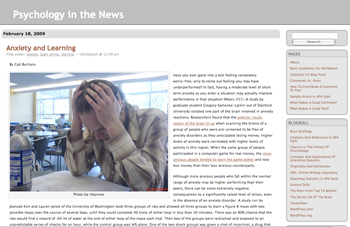PSYC 105
 Taught by: Nicholas de Leeuw
Taught by: Nicholas de Leeuw
The Course
What is the course in which you use instructional technologies about? Tell us about its origin, goals and objectives.
I am using a blog in my Introductory Psychology course. This is a course that has been around since the beginnings of the psychology department, long before my time. The challenge in such a legacy course is not only to keep up to date with the field, but also to keep the course itself fresh. Adding a student-written blog has added a new dimension to a course which also has a lot of tradition built into it.
The Technology
What were the technologies used and how did they change or enhance your course?
I used a free public blog hosting site, WordPress, to create a website with continuously changing content that is accessible to anyone on the web. I remind students frequently that what goes up on the blog will be read by many people who merely stumble across it in a Google search.
Students are asked (required, really) to write posts for the blog which are based on current research in the field, but which also provide some background information and personal touches. The emphasis is on writing for an general public (“smart people like you, but with no background in psychology” I tell them), rather than writing for the professor. I find this actually enables students to write better, perhaps because they can identify with that audience.
The Student Response
How have your students responded to your use of technology?
For me, this is a substitute for more formal writing assignments like a short research paper. I think most students get more excited about it, and do better work. Some prefer to remain anonymous, but they still know that many people will be reading what they write. Some posts on the site have had thousands of “hits” (people who open the page), and all of them are guaranteed at least a core audience of students in the course.
The comments that students write (again, a requirement) display a great deal of thoughtfulness about what other students have written. This is no substitute for real face to face discussion in a classroom, but my read of their comments is that they are gaining practice in being polite while still holding their own distinctive point of view, and with backing up that view with evidence. It would be too much to ask for that attitude to always transfer to the classroom in a 200 level course, but I am happy to see it when I can.
The Challenges
What are the challenges you faced teaching this course?
Adding any new component adds work to a course. I have had to adjust the requirements for posting and commenting so that I can keep up. In an ideal course, students would not have to wait more than a few days for me to give them feedback on a draft of a post, and I would get them all posted soon after a draft revision. That is not going to happen. But this is my third semester at it, and it does keep getting smoother.
New Directions
What new directions would you like to explore with technology in your teaching?
I’d like to feel the blog is working pretty well now, and maybe it will be a few years before I feel compelled to shake up that part of the course. But there are other issues I am working on. After having built up a collection of PowerPoint shows for the courses that I teach regularly, the challenge now is to strip them down to essentials. I like the ability to use images in a lecture, and my handwriting on the board is not great, but I am trying to revise each show so that the words on the screen do not interfere with the lecture and conversation in the class. In my research methods class, I have students writing collaboratively, and I am wondering if I could have them do that in a way that is more public, so that I can see the process a little more, as well as the product.

